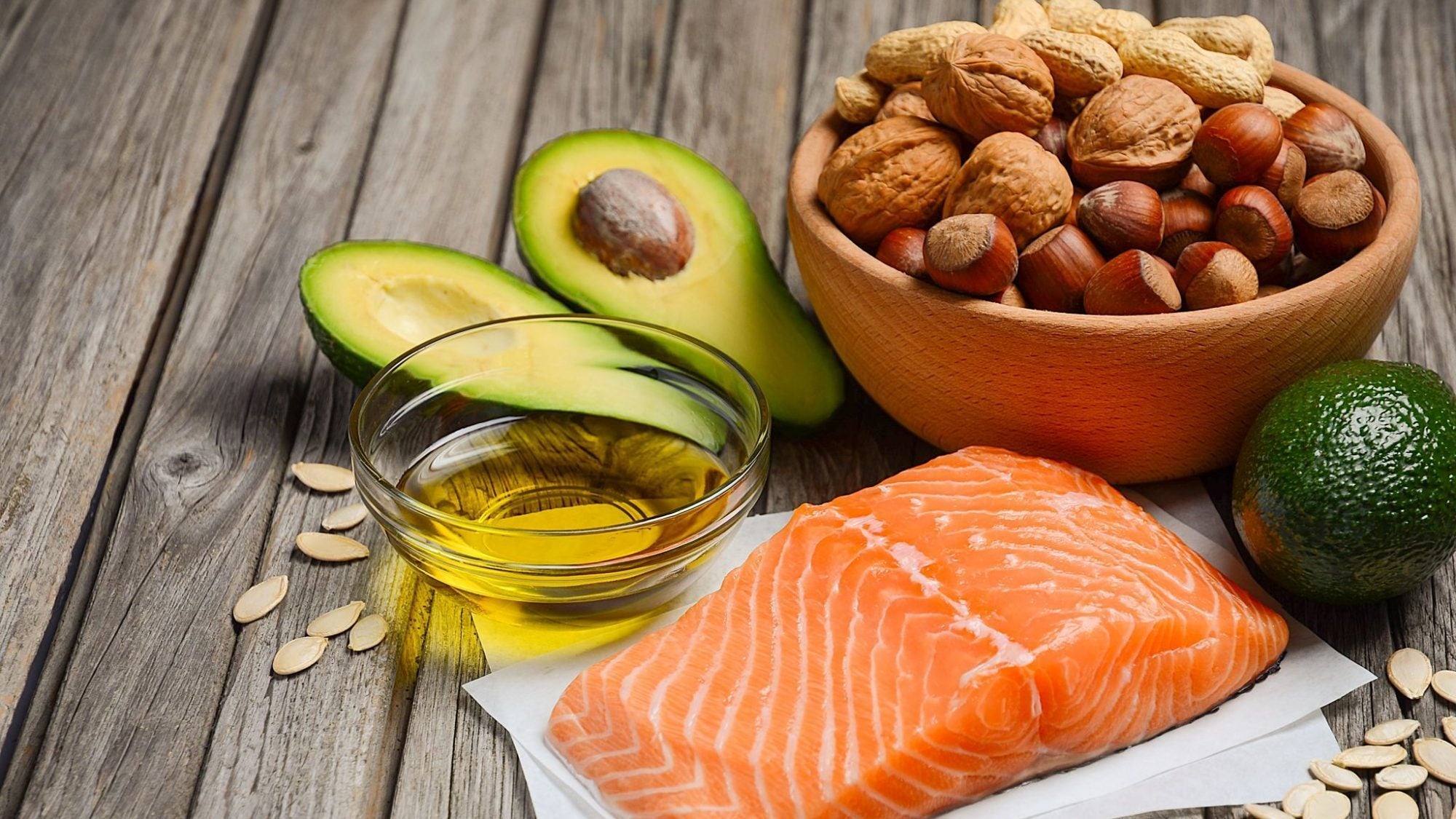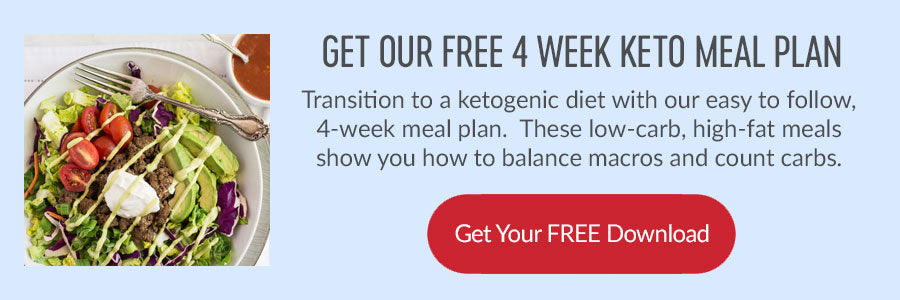Your Guide to the Pros and Cons of the Keto Diet

It’s being hailed as a way of eating for sustainable weight loss and improvements in physical and mental health. Research shows the keto diet may also be beneficial to patients with diabetes, cancer, and Alzheimer’s disease [1, 8, 9].
But it has its share of critics as well. The keto diet is sometimes referred to as “the bacon and butter diet” because it calls for 75% of daily calories to come from fat. Ketogenic dieters are eating pork, avocados, and adding butter to their morning coffee. They’re drowning their salads with ranch dressing.
So what are the pros and cons of the keto diet?
Believe it or not, we don't think the ketogenic diet is for everyone. That may be a bold statement to make for a keto company, but we stand by it.

How the Ketogenic Diet Works
For the pros and cons of keto to make sense, you need to understand what it is.The ketogenic diet was initially developed as a therapeutic way to treat seizures in patients with epilepsy. It's now viewed as a natural way of eating that can be beneficial beyond just those who suffer from seizures.
The diet is made up of roughly:
- 75% fat
- 20% protein
- 5% carbohydrates.
Fat, protein, and carbohydrates are called macronutrients - “macros” for short. To achieve a keto macro breakdown of 75% fat, 20% protein, and 5% carbs, you first need to know that:
- One gram of fat contains 9 calories
- One gram of protein contains 4 calories, and
- One gram of carbohydrate contains 4 calories.
FAT
- 2,000 calories x 75% fat = 1,500 calories
- 1,500 calories / 9 calories per gram = 167 grams of fat
PROTEIN
- 2,000 calories x 20% protein = 400 calories
- 400 calories / 4 calories per gram = 100 grams of protein
CARBOHYDRATES
- 2,000 calories x 5% carbohydrate = 100 calories
- 100 calories / 4 calories per gram = 25 grams of carbohydrates
Getting into ketosis is a critical component of the ketogenic diet.
You can achieve ketosis by fasting, cutting carbs drastically (typically under 50 grams a day), and/or taking keto supplements, such as BHB (exogenous ketones) and MCT-based meal replacement shakes.
After becoming fat-adapted, incorporating intermittent fasting (IF) can help boost weight loss or break weight loss plateaus. The most common method of intermittent fasting is 16:8. This is when you go 16 hours without eating and consume all of your calories during an 8-hour eating window.
To find out whether you have achieved ketosis, you can test your blood or urine for the presence of ketone bodies. Depending on your:
- Diet
- Activity level
- Body type
- Metabolic state
- Genetics
The Pros of the Ketogenic Diet
The ketogenic diet can come with many benefits, even beyond weight loss which is it's most common application.1: Keto Supports Weight Loss
When your body enters ketosis, it goes into fat-burning mode, which supports fat loss. Cutting carbs also causes your body to retain less water, which can lead to weight loss [2, 4, 6, 7, 9]. Note that we said weight loss -- water weight isn't fat, but it sure feels like it (you'll know what we mean if you've ever been bloated).The ketogenic diet supports fat loss for a few other reasons as well. Because carbs have fewer calories and digest quickly, giving your blood glucose levels a quick spike only to crash again shortly thereafter, they aren't very satisfying. That means that while you may feel full right after eating carbs, you'll feel hungry again in a shorter period of time than you would with fats or proteins.
That's why Chinese food makes you feel like a bottomless pit.
Fat is very satiating, and it's also rich. When people switch to a low-carb diet and replace the carbs with fats, they mostly find that they can't eat nearly as much as they could with carbs, which means a decrease in caloric intake and ultimately fat loss.
Finally, keto-ers love supplementing their ketogenic diets with MCT oil, as it's regarded as the ultimate ketogenic fat source. Research suggests that those who consume MCT oil (or other supplements that contain MCTs like Keto Meal Replacement) in conjunction with a ketogenic diet saw greater weight loss results than those who did not [1].
2: Keto Suppresses Appetite and Enhances Satiety
We just mentioned that the ketogenic diet supports weight loss because it often causes you to eat less. The high amount of fats in the keto diet minimizes carb cravings, provides steady energy for hours, and suppresses appetite [2, 6].This is true for most people and regarded as one of the best things about the keto diet.
Besides the obvious health benefits to not being hungry all the time, (say goodbye to hunger pangs!) a huge plus is that you spend less time preparing and thinking about food, which frees up your time for more important things.
3: Keto May Lower Cholesterol.
Wait, what? Eating a high fat diet can lower cholesterol?Yes, seriously. At least, the cholesterol you should be concerned about.
Studies show the keto diet can improve “good” cholesterol (HDL) and lower “bad” cholesterol (LDL). Eating fat increases blood levels of HDL. The higher your levels of HDL, the lower your risk of heart disease.
But that’s not all. Eating low-carb can also change your LDL cholesterol, altering it from “bad” to “benign” cholesterol. It does this by turning LDL particles from small (high risk of heart disease) to large (low risk of heart disease) while also decreasing the number of LDL particles in the bloodstream [2, 3, 6, 9, 10, 11].
4: Keto Supports a Reduced Risk for Heart Disease.
Fat used to get a bad rap for not being heart healthy. And (crazily enough), carbs and grains were seen as positive for heart health.We now know better, and research shows that reducing carb intake can lower blood triglycerides, which are fat molecules in the blood. High levels of blood triglycerides can put you at higher risk for heart disease [3, 4, 6, 7, 9].
5: A Ketogenic Diet May Lower Blood Pressure
Research shows eating a low-carb diet can have positive impacts on blood pressure. Hypertension is a risk factor for many diseases, including heart disease, stroke, and kidney failure [4, 6, 7, 9].6: Reduces Insulin Levels and Insulin Resistance
Studies show the keto diet can reduce blood sugar and insulin fluctuations due to reduced carbohydrate consumption.Better insulin control can also help improve the associated metabolic disorders and symptoms linked to high insulin and blood sugar [2, 4, 9].
7: Keto Improves Cognitive Function
One of the best perks of a ketogenic diet is the improvement in cognitive function. Fat is converted into ketones in your liver and then sent to the brain. Ketone bodies (aka ketones) are able to cross that blood-brain barrier, so can be used as energy by your brain cells.The keto diet has been used for decades to treat epilepsy in children, and it is currently being studied for its potential beneficial impacts on other neurological diseases, such as Alzheimer’s and Parkinson’s [1, 12] because of this.
8: Ketosis Enhances Mood, Sleep and Energy
Most people report needing to sleep more.But that's not the benefit to sleep that the ketogenic diet carries. Many ketogenic dieters find that when their body has entered ketosis, they need less sleep to feel as alert, energetic, and healthy as they previously did on the same amount.
Because your hormones aren't following the insulin spikes and crashes that are typical of the Standard American Diet (SAD), most ketogenic dieters report feeling more stable and level, and being in a better mood [12, 13].
9: Keto Boosts Energy Levels
The sluggishness and lethargy you feel after a heavy carb-filled meal happens because of that insulin spike and reactive sharp drop in blood sugars.Eating a high-fat diet provides steady energy and helps you avoid crashes that are associated with eating a high-carb diet.
Since ketones are the brain’s preferred source of energy, a ketogenic diet leaves you feeling more alert and mentally energized without having to supply a steady stream of calories [13].
10: The Ketogenic Diet Supports Regulated Hormones
One of the topmost reported reasons for women wanting to try the ketogenic diet besides weight loss is for hormonal balance.Women who suffer from hormone imbalance may find relief with the ketogenic way of eating. For example, research supports that keto may help with:
- Polycystic Ovarian Syndrome (PCOS) and related infertility. By avoiding insulin spikes while following a ketogenic lifestyle, women with PCOS report a reversal of increased androgen hormones, specifically testosterone, which leads to a reduction in PCOS symptoms and increased fertility [14].
- Thyroid health and longevity. Along with balancing sex hormones, a ketogenic lifestyle has a positive effect on thyroid hormones as well. A very low-carb diet tends to drive down T3, the main active thyroid hormone. Higher T3 levels make your cells use more energy (hyperthyroidism), which can increase free-radical production. Many scientists believe that lower levels of T3 actually increase lifespan by conserving energy and decreasing free-radical production. A ketogenic lifestyle is positively correlated with improved thyroid health and overall longevity [15].
The Cons of the Ketogenic Diet
There are many advantages of keto, but you also have to consider the downside.1: Keto Requires an Adaptation Process
Getting keto adapted can take one to two weeks and the transition can be uncomfortable for some people.The “keto flu” is commonly used to describe flu-like symptoms associated with the transition process:
- headaches
- fatigue
- nausea
- muscle aches etc.
2: Keto May Cause Irregularity
Dramatically increasing your fat intake while drastically cutting your carb intake may cause gastrointestinal issues, ranging from constipation to diarrhea.This is something that should resolve itself when your body gets fat-adapted [5]. There is also the potential for nausea, particularly when switching from a low-fat diet to the ketogenic diet. It can take a while for the gall bladder, pancreas, and liver to adapt to digesting high amounts of fat [17].
3: The Ketogenic Diet Restricts Certain Foods
Some people simply don’t like banning entire food groups, and the keto diet requires you to give up all forms of sugar (no more candy, ice cream (unless it's keto ice cream), or donuts, and popular carbs such as bread (well, except keto bread), rice, and pasta (no more pizza and burgers).Keto also limits most fruits due to the fructose content, as well as starchy vegetables such as potatoes and corn. The good news is that as your body becomes keto-adapted, your sugar cravings will dramatically fall or disappear altogether.
4: Keto May Cause High Cholesterol for Certain People
While most people will see their cholesterol fall along with their weight, there are some that may see the opposite due to the meat-heavy nature of the diet. This is typically a genetic predisposition and means the keto diet is not right for everyone [11].5: Makes Social Gatherings Harder
Dining out at restaurants will require more planning and research due to hidden carbs on restaurant menus. Attending birthday parties, weddings, and other social events will require more self-discipline.If you want to drink alcohol, you’ll have to limit yourself to one or two low-carb drinks. This means dry wines (the dryer the better!) and unflavored clear liquors, such as vodka, gin, and tequila.
There are a surprising number of keto-friendly alcoholic beverages that won't knock you out of ketosis. For dessert, dark chocolate (at least 70% cocoa) is okay in moderate amounts. Stick to keto-friendly chocolates that are naturally sweetened with zero-calorie sweeteners such as stevia and erythritol. You can have sugar-free candies on occasion, just be aware that the sugar alcohols may cause digestive discomfort if you have too much.
Weigh Whether the Ketogenic Diet is Right For You
Now that you have a better understanding of the pros and cons of keto, here are a few other resources that can help you make a decision about whether this way of eating is right for you.When starting a new diet, consult your doctor prior to making any significant changes, especially if you take any prescription medication.
Top Keto Resources
The Top 10 Things You Need to Know Before Going Keto: Thinking about giving the ketogenic diet a try? People are using it not only to lose weight, but to feel more energized, sleep better, and improve their mental focus. It’s not hype. The keto diet is a top health trend because it works. But before you go all in, here are the top 10 things you should know.KetoLogic® Recipes: We’ve developed each recipe to help you enjoy a keto lifestyle. Many of our recipes also fit perfectly into most Paleo and other low-carb/high-fat (LCHF) diets. Use them to help lose weight, maintain your form, feel more energetic, and supercharge your body and your brain.
KetoLogic® Products: Starting a new diet can be hard so KetoLogic wants to make the transition as easy as possible. KetoLogic supplements are designed to simplify meal planning, help you lose weight, and support ketosis.
KetoLogic® KetoMeal® is a delicious source of healthy fat macros and helps boost ketone production.
KetoLogic® BHB replenishes your electrolytes, supports ketosis, and suppresses your appetite. These two keto products work together to help you lose weight, elevate energy levels, and improve physical and mental performance.
References:
- https://www.ncbi.nlm.nih.gov/pmc/articles/PMC2367001/: Neuroprotective and disease-modifying effects of the ketogenic diet
- http://www.nejm.org/doi/full/10.1056/NEJMoa022637: A Low-Carbohydrate as Compared with a Low-Fat Diet in Severe Obesity
- https://www.ncbi.nlm.nih.gov/pubmed/23680948: Treatment of diabetes and diabetic complications with a ketogenic diet.
- https://www.ncbi.nlm.nih.gov/pubmed/28534852: Effects of Ketogenic Diets on Cardiovascular Risk Factors: Evidence from Animal and Human Studies.
- https://www.livestrong.com/article/509998-do-low-carbs-affect-bowel-movements/
- https://jamanetwork.com/journals/jamainternalmedicine/fullarticle/217514: The National Cholesterol Education Program Diet vs a Diet Lower in Carbohydrates and Higher in Protein and Monounsaturated Fat
- https://www.ncbi.nlm.nih.gov/pubmed/12761365: A randomized trial of a low-carbohydrate diet for obesity.
- https://www.ncbi.nlm.nih.gov/pubmed/25666556: Mitochondria: The ketogenic diet–A metabolism-based therapy.
- https://www.ncbi.nlm.nih.gov/pubmed/17341711: Comparison of the Atkins, Zone, Ornish, and LEARN diets for change in weight and related risk factors among overweight premenopausal women: the A TO Z Weight Loss Study: a randomized trial.
- http://atvb.ahajournals.org/content/12/2/187.short: Low density lipoprotein particle size and coronary artery disease.
- https://academic.oup.com/jn/article/136/2/384/4664306: Carbohydrate Restriction Alters Lipoprotein Metabolism by Modifying VLDL, LDL, and HDL Subfraction Distribution and Size in Overweight Men
- https://www.ncbi.nlm.nih.gov/pubmed/29046155: Impact of dietary fats on brain functions.
- https://www.ncbi.nlm.nih.gov/pubmed/28706467: Ketogenic diet benefits body composition and well-being but not performance in a pilot case study of New Zealand endurance athletes.
- https://www.ncbi.nlm.nih.gov/pmc/articles/PMC1334192/pdf/1743-7075-2-35.pdf
- https://academic.oup.com/jcem/article/91/8/3232/2656790
- https://www.ncbi.nlm.nih.gov/pubmed/28074888#cm28074888_52891: A review of the carbohydrate-insulin model of obesity.
- Khodarahmi M, Azadbakht L. Dietary fat intake and functional dyspepsia. Adv Biomed Res. 2016 Apr 21;5:76.
-
Posted in
Authority Article, Nutrition, Nutrition Article, Starting Keto





